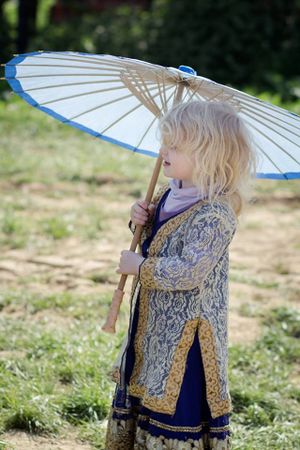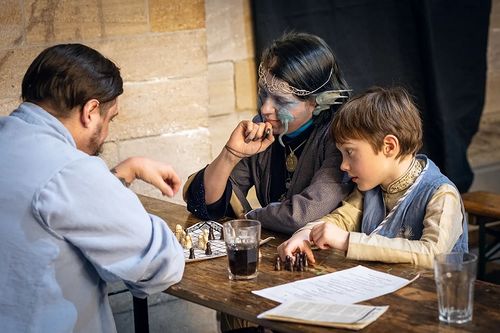Urizen children
m (moved Urizen Children to Urizen children) |
mNo edit summary |
||
| (6 intermediate revisions by 2 users not shown) | |||
| Line 1: | Line 1: | ||
{{CaptionedImage|file= | <div style="float:right; width: 300px; clear: right;">{{CaptionedImage|file=Parasol.jpg|caption=Urizen children are expected to always be learning new things.|align=right|width=300}}</div> | ||
<quote>Don't limit your children by making their lives easy.</quote> | <quote>Don't limit your children by making their lives easy.</quote> | ||
Children in Urizen are expected to learn. It is common practice during an evening meal to ask the children what they have learnt today, and question them not only about their studies but also about their more practical experiences, to tease lessons and understanding of social rules out of them. | Children in Urizen are expected to learn. It is common practice during an evening meal to ask the children what they have learnt today, and question them not only about their studies but also about their more practical experiences, to tease lessons and understanding of social rules out of them. | ||
| Line 5: | Line 5: | ||
A sun- or otherwise light-bathed courtyard will often be set aside for children within a [[spires|spire]]; depending on the dominant practices of the spire it may also have puzzles or contemplative games set up there. Young children are often given puzzle toys and left to discover their working with minimal interference, except when their frustration rises and thus their capacity for fruitful exploration is exhausted for that time. Families with young children often share responsibility, for example each afternoon one family or another might take all the youngsters, generally on a schedule, and allow the other parents to pursue their own endeavours for a few hours. | A sun- or otherwise light-bathed courtyard will often be set aside for children within a [[spires|spire]]; depending on the dominant practices of the spire it may also have puzzles or contemplative games set up there. Young children are often given puzzle toys and left to discover their working with minimal interference, except when their frustration rises and thus their capacity for fruitful exploration is exhausted for that time. Families with young children often share responsibility, for example each afternoon one family or another might take all the youngsters, generally on a schedule, and allow the other parents to pursue their own endeavours for a few hours. | ||
Older children are taught to use the libraries and to conduct their own research, for example by studying an object, or asking questions of several adults on a given topic. They are also encouraged to put the knowledge they gain into action, for example by assisting a | Older children are taught to use the libraries and to conduct their own research, for example by studying an object, or asking questions of several adults on a given topic. They are also encouraged to put the knowledge they gain into action, for example by assisting a crafter, scholar or other person for a day. In spires with many children, a junior scholar may take on the role of disseminator, who arranges a regular program of theoretical and practical placements for older children with various respected individuals. These placements may lead on to apprenticeships, unless the child has shown promise in a discipline which would be better progressed by moving to study with a master in a neighbouring spire. | ||
Although children are not taught magical principles until after they prove their maturity and come of age, they are often taught of the Realms and Eternals, often without the element of caution seen elsewhere in the Empire. | Although children are not taught magical principles until after they prove their maturity and come of age, they are often taught of the Realms and Eternals, often without the element of caution seen elsewhere in the Empire. | ||
<div style="float:right; width: 500px; clear: right;">{{CaptionedImage|file=Journey.jpg|caption=Ask questions, and think about the answers.|align=right|width=500}}</div> | |||
=== Things every Urizen child should know === | === Things every Urizen child should know === | ||
*'''Ask questions, and think about the answer.''' If you don't understand something, ask more questions until you do. | *'''Ask questions, and think about the answer.''' If you don't understand something, ask more questions until you do. | ||
| Line 15: | Line 15: | ||
*'''Do not be afraid to disagree. ''' Reason and debate are the paths to knowledge and even adults can be wrong. | *'''Do not be afraid to disagree. ''' Reason and debate are the paths to knowledge and even adults can be wrong. | ||
*'''Once you have learned something, use it.''' Knowledge never used may just as well never have been learned. | *'''Once you have learned something, use it.''' Knowledge never used may just as well never have been learned. | ||
[[Category:Children]] | [[Category:Children]] | ||
{{Urizen Links}} | |||
Latest revision as of 12:36, 6 April 2023
Don't limit your children by making their lives easy.
Children in Urizen are expected to learn. It is common practice during an evening meal to ask the children what they have learnt today, and question them not only about their studies but also about their more practical experiences, to tease lessons and understanding of social rules out of them.
A sun- or otherwise light-bathed courtyard will often be set aside for children within a spire; depending on the dominant practices of the spire it may also have puzzles or contemplative games set up there. Young children are often given puzzle toys and left to discover their working with minimal interference, except when their frustration rises and thus their capacity for fruitful exploration is exhausted for that time. Families with young children often share responsibility, for example each afternoon one family or another might take all the youngsters, generally on a schedule, and allow the other parents to pursue their own endeavours for a few hours.
Older children are taught to use the libraries and to conduct their own research, for example by studying an object, or asking questions of several adults on a given topic. They are also encouraged to put the knowledge they gain into action, for example by assisting a crafter, scholar or other person for a day. In spires with many children, a junior scholar may take on the role of disseminator, who arranges a regular program of theoretical and practical placements for older children with various respected individuals. These placements may lead on to apprenticeships, unless the child has shown promise in a discipline which would be better progressed by moving to study with a master in a neighbouring spire.
Although children are not taught magical principles until after they prove their maturity and come of age, they are often taught of the Realms and Eternals, often without the element of caution seen elsewhere in the Empire.
Things every Urizen child should know
- Ask questions, and think about the answer. If you don't understand something, ask more questions until you do.
- Write down anything important that you learn. Not just from your lessons, but anything you think might be useful for the future.
- Practice doing things until you do them right. This might mean drawing, counting or fighting, but you can get good at almost anything and anything worth doing is worth doing right.
- Do not be afraid to disagree. Reason and debate are the paths to knowledge and even adults can be wrong.
- Once you have learned something, use it. Knowledge never used may just as well never have been learned.
Further Reading
Core Brief
Additional Information

